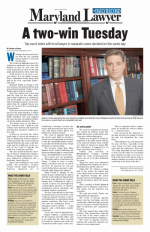Man found not guilty following what lawyers say was false confession.
by Danielle E. Gaines, Staff Writer.

Christopher Anderson/The Gazette Marvin Cuque (right), who was released from jail and after serving nine months for a crime he was acquitted of by a jury, and his attorney, Andrew Jezic, talk about being able to spend the holidays at home with his family
Helen Vasquez told a white lie as her 4-year-old son peered through the plate glass at the Montgomery County Detention Center in March. On the other side of the partition was her husband, Marvin Cuque.
“Daddy’s dirty from fixing all the buses, so he has to stay back there,” she told their son. Cuque, a safety auditor at Washington Metropolitan Area Transit Authority, went along with the ruse.
Cuque’s wife visited her husband under the cover of that same lie for 40 minutes at a time, once per week, for the next nine months.
Cuque spent exactly 271 days behind bars last year — an ordeal he describes as “sort of like hell.”
He was released Nov. 30 — just in time for the holidays — after a jury concluded he was not guilty of the charges against him.
“It was a lot of pain. So much pain,” Cuque said later. “I had never been arrested before.”
The 35-year-old Guatemala native was arrested by Montgomery County Police on Sept. 17, 2010, and charged with second-degree sex offense, child molestation and abuse of a child by a custodian — crimes that could carry a prison sentence of more than 35 years. He was released from jail the same day, but later detained without bail, starting March 4, after prosecutors said his connection with Guatemala posed a flight risk.
According to police and prosecutors, the crimes Cuque was charged with occurred in 1999 or 2000 when he and a former girlfriend boarded with a woman and her three children at the White Oak Towers complex on Old Columbia Pike in White Oak.
During an interrogation with two police detectives in Rockville on Sept. 14, Cuque was flustered. He didn’t learn to speak English until he moved to Silver Spring in 1984 at the age of 6. In a psychological evaluation after his arrest, he said he still has difficulty “finding the right words in English.”
Toward the beginning of the one-hour-and-15-minute interrogation, when one detective asked Cuque if she was “right in thinking that, you know, you guys didn’t have full blown sex?” Cuque responded: “Not even touching.”
He went on to deny the allegations nine more times before answering “Yes,” when a detective asked if he felt bad about what had happened. When the detective asked him whether the girl had put her mouth on his penis, Cuque said “Probably, yeah, I guess so.”
Cuque explains the admission by a lifelong nervousness around police and a feeling that they were out to get him during the interrogation. During the psychological evaluation after his arrest, Cuque said he thought, “Even though I didn’t do it, if I admit to touching, it wouldn’t be a big deal and they will stop.”
Days later, he was arrested and charged. After meeting with an attorney and again asserting that he was innocent, Cuque entered an Alford plea, a plea in which a defendant refuses to accept guilt, but acknowledges the prosecution likely has enough evidence for a conviction.
Unlikely assistance
After a Montgomery County Circuit Court judge accepted the Alford plea in April and days before Cuque was scheduled to be sentenced for second-degree sex offense, the ex-girlfriend who lived with him stepped in. Her mother hired Wheaton-based attorneys Andrew V. Jezic and David H. Moyse to defend Cuque.
“It wasn’t a decision we jumped on,” Moyse explained later. “We had the video [of the interrogation], met with Marvin several times, met with experts. The bottom line was, we believed him when we looked at him eye to eye. False confessions do happen.”
The attorneys quickly came to think that several factors led to a false confession: Cuque’s stunted education, non-confrontational demeanor and tendency to please others — coupled with interrogation techniques that minimized the crime he was accused of and maximized the case against him with the threat that officers would “think the worst” if he didn’t confess.
Cuque said after police told him the girl had passed a lie detector test, he felt as though police would not believe he was innocent. He believed lie detector tests were 99 percent accurate because of their use on daytime talk shows, he said.
“In my opinion, given the totality of the circumstances, I feel that Mr. Cuque was at risk to make a false confession,” Dr. Michael J O’Connell, a forensic psychologist from Ellicott City, wrote in an evaluation of Cuque.
At trial, Jezic was barred from calling O’Connell as an expert witness on false confessions because Judge Robert A. Greenberg thought O’Connell would tell the jury information they could conclude through other testimony.
In the final hours of a five-day trial that stretched through the Thanksgiving holiday, Cuque’s attorneys presented the jury with a parade of witnesses who testified to his character. Among them was his boss at WMATA.
“To have 10, 12 people available as character witnesses, that is difficult,” Jezic said. “Because some character witnesses, when they know the charges, will back off.”
Helen Vasquez took the stand in defense of her husband as well.
“I was always supportive. I never doubted him,” Helen said. “I never doubted his honesty and his innocence. I knew I had to be brave and tell [the jury] who my husband was and that I knew the man I married.”
After six hours of deliberation, during which the jurors watched the interrogation video twice, they emerged with a verdict: Not guilty. On all counts.
“It was like a thunderbolt,” Jezic said.
After incarceration
Maryland jurors are anonymous in court and identified only by number. Although jurors could not be reached after the verdict, Jezic said he spoke with several of them.
“The jurors hung around and talked with us and it came down to not having much faith in the confession,” Jezic said.
The prosecutor, Deborah W. Feinstein, did not return a call for comment about the verdict. Montgomery County Police spokeswoman Sgt. Jennifer McNeal referred all questions about the crime to the State’s Attorney’s Office because she said it was an open case.
Cuque finds it hard to describe the emotions he felt as the verdict was read. The hours after were a blur as well.
“The first thing I saw was my wife and my son running toward me. It was very beautiful,” he said.
They walked together to California Tortilla, where Cuque ordered a soda and savored the moment.
“I couldn’t believe I was walking out of the court building and into freedom. The fresh air was the main thing,” Cuque said.
Cuque’s trials won’t soon be finished. His court file remains open to inspection, because it could hurt his bid for U.S. citizenship to have the records expunged. While Cuque has a green card, the ambiguous paper trail left by an expungement could create complications when he applies for citizenship, Jezic said.
Despite everything, Cuque said he has not lost faith in the legal system.
“In the end, the jurors did what our system allows,” he said.
While he was imprisoned, the life Cuque had worked so hard for came crashing down around his wife. Two of the family’s cars were repossessed, mortgage payments went unpaid. Helen went back to work at a former job with Chipotle, but couldn’t keep up with the financial demands.
For Christmas this year, the family had to wait until payday Dec. 23 to buy gifts and hurriedly wrap them on Christmas Eve, hours before the family’s celebration. Each year, at midnight on Christmas morning, before opening their gifts, the family gathers to pray and call extended family in Guatemala.
“Every time I talk to my mother, she cries,” Cuque said.
For Jezic’s part, he was pleased to be able to reunite a family for the holidays.
“Daddy was the biggest gift,” Jezic said.







